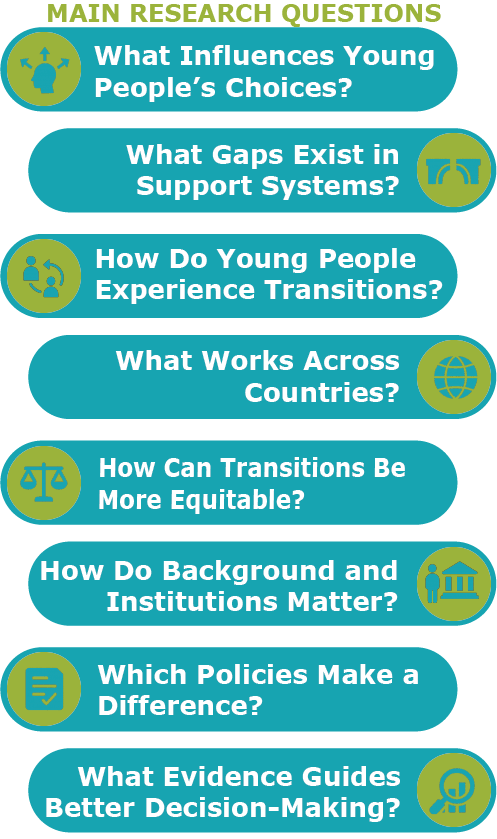What EDU-LAB aims to
understand and achieve
EDU-LAB is a Horizon Europe project that investigates how young people across Europe manage the transitions in and from education and training to employment – and how these paths can be made fairer, more informed and more just, informed and resilient. In the face of rapid social, economic and technological change, these transitions have become increasingly complex. EDU-LAB therefore asks what factors determine young people's decisions, how institutional systems and policies influence their opportunities, and what interventions are appropriate to improve outcomes.

At its core, the project aims to identify and explain the patterns and inequalities that exist in youth transitions in education, training and employment across different European countries and regions. It examines how aspects such as gender, socio-economic background and type of education or training pathway shape young people's experiences and future prospects. At the same time, EDU-LAB takes a close look at the surrounding structures – such as school systems, labour markets, counselling services and public programmes – to understand how these systems either support or hinder transitions.
Project goals
A central goal of the project is to evaluate the effectiveness of policies and programmes designed to support young people in planning their educational and employment paths. By analysing existing services and their impact, EDU-LAB aims to provide evidence-based recommendations for action to policymakers and practitioners across Europe. The project places great emphasis on including the perspectives of the young people themselves: Qualitative case studies and participatory research methods create space for the young people, their experiences, expectations and challenges and to reflect on the systems that are supposed to support them.
Research Questions

A series of key research questions serve as a guide: What factors influence young people's decisions regarding education, training and employment? How do policies and institutional frameworks in different countries affect these transitions? What obstacles or enabling conditions exist for young people from different backgrounds? How do young people perceive the options available to them, and what support do they find helpful or lacking?
Research methods
By combining comparative theoretical modelling, policy mapping and youth-led qualitative research, EDU-LAB aims to gain new insights that will not only advance the scientific discussion but also contribute to more effective and inclusive policies. Complementing the fieldwork, EDU-LAB uses secondary analysis of existing large-scale datasets to uncover structural patterns and inequalities in youth transitions from education and training to the labour market. Ultimately, the project aims to design education and employment systems that work better – and more fairly – for all young people in Europe.
Subscribe to our bi-annual newsletter and follow us on LinkedIn, Facebook, Instagram, and Bluesky to receive updates on our findings, events, and opportunities to engage with EDU-LAB.
